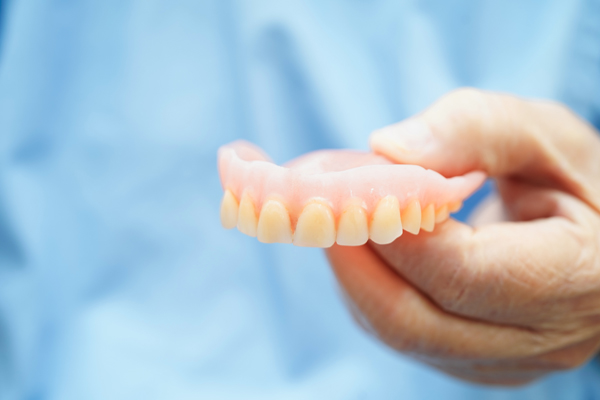 Dentures are one of the most well-known tooth replacement options available. However, there is another option—dental bridges. Both of these replacement options have the ability to restore a smile's appearance and function, but they offer key differences. Understanding the differences can better help you decide which option is most effective for you.
Dentures are one of the most well-known tooth replacement options available. However, there is another option—dental bridges. Both of these replacement options have the ability to restore a smile's appearance and function, but they offer key differences. Understanding the differences can better help you decide which option is most effective for you.
What are dental bridges?
A dental bridge is a fixed restoration that replaces one or more missing teeth by spanning, or "bridging," the gap. The natural teeth or dental implants anchor the bridge on either side of the gap. These supporting teeth, known as abutments, are fitted with crowns that hold the bridge securely in place. The result is a natural-looking, permanent solution that restores chewing and speaking ability.
Dental bridges are often chosen for their durability and stability. Since they are bonded to the abutment teeth or implants, they feel much like natural teeth. This makes them appealing to patients seeking a long-term solution without needing removal or additional adhesives.
How do dentures differ from dental bridges?
Dentures, on the other hand, are removable prosthetics designed to replace several or all missing teeth. They are custom-made to fit the patient's gums and are available in full or partial designs. Full dentures replace an entire arch of teeth, while partial dentures fill in gaps among remaining teeth.
Dentures typically comprise lightweight yet durable materials such as acrylic or metal. Advances in dental technology have made modern dentures more comfortable and natural-looking, giving patients an effective solution for extensive tooth loss. It is good to note that traditional dentures are not fixed in place like dental bridges and require adhesives for added stability. However, like with dental bridges, patients may have the option to anchor them using dental implants, forgoing the need for adhesives.
The durability and stability of dental bridges and dentures
Many often prefer a dental bridge for its secure, permanent fit. Patients can chew, speak, and smile normally as the bridge remains in place without shifting. Bridges also integrate seamlessly into a daily oral hygiene routine, as patients can brush them like natural teeth. They may require a different type of floss, but this usually does not add time to patients' oral hygiene routines.
Dentures, while versatile, are not as stable as bridges. Because they are removable, they can sometimes slip or shift during eating or talking. This may take some time to adjust to, particularly for patients new to dentures. However, their removability does make them easy to clean and maintain separately from the mouth.
Maintenance requirements for dental bridges and dentures
Both dental bridges and dentures require proper care to ensure longevity and effectiveness. A dental bridge should be cleaned daily with brushing and flossing, as plaque and debris can build up around the crowns and bridge components. Regular dental checkups are important to monitor the bridge's condition and the abutment teeth' health.
Dentures require a different care approach. Patients must remove them for cleaning and soak them in a denture cleanser to prevent bacteria buildup. Patients must also clean their gums and remaining teeth to maintain oral health. While dentures can be more maintenance-intensive, this routine becomes second nature with practice.
Restore your smile
The right option often depends on factors like the number of missing teeth, the condition of surrounding teeth and gums, and a patient's personal preferences. If you are looking for a tooth replacement solution, a dental bridge or dentures may be a viable solution. To learn which is most effective for you, contact Carrollton Smiles and schedule an appointment.
Request an appointment or call Carrollton Smiles at 757-712-0212 for an appointment in our Carrollton office.
Related Posts
You can have a complete smile with a dental bridge. Tooth loss interrupts proper eating and speaking. This dental replacement option allows the wearer to regain proper oral function. Knowing how a dental bridge can bring back your oral functionality can motivate you to set an appointment with your dentist soon.It can be challenging to…
Losing a tooth can affect more than just your smile; it can also impact how you eat, speak, and maintain oral health. Dental bridges are a popular and effective solution for filling gaps left by missing teeth. By understanding the different types of dental bridges, you can work with a general dentist to find the…
A dental bridge is an effective solution for replacing missing teeth and restoring function and appearance. When considering a dental bridge, patients often encounter two main options: traditional and Maryland bridges. Understanding the differences between these types can help patients make an informed decision tailored to their specific dental needs and preferences.A traditional dental bridge…


